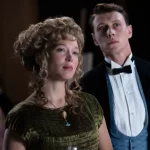I Want You to Know That I’m Happy for You, by David Bax
Though James Ponsoldt’s excellent new film, The End of the Tour, is the movie where Jason Segel plays David Foster Wallace, it would be incorrect to say that it’s a movie about the late, celebrated author. Adapted from a book by David Lipsky, it takes place over the span of a long weekend in which Lipsky (Jesse Eisenberg) stayed at Wallace’s house and accompanied him on the last stop of his Infinite Jest book tour in preparation for a Rolling Stone profile Lipsky was to write. For most of its length, the film is a two-hander but there can be no mistake. This is Lipsky’s story.
Ponsoldt and screenwriter Donald Margulies use as a framing device Wallace’s 2008 death and Lipsky’s subsequent memorializing that led to his book. Thankfully, this makes for better and more relevant bookends than the hackneyed college application letter that began and ended Ponsoldt’s last feature, the otherwise quite good The Spectacular Now. It gives us a chance to reflect on the difference between the more current Lipsky and the twelve years younger version who occupies the bulk of the film. Thanks to an assured and nuanced performance from Eisenberg, we learn a lot about both versions of the character. Eisenberg lets us infer Lipsky’s many insecurities from his flitting expressions and brief hesitations. We learn plenty about Segel’s Wallace as well but he is never on the screen without Lipsky save for a funny and touching moment when he speaks into Lipsky’s tape recorder while the other David is in the bathroom.
Ponsoldt has no trouble selling the 1996 period details, mostly because his primary interest in selling the location and time of the year make it easy to do so. With Michigan subbing in for Illinois, Ponsoldt and his team, including cinematographer Jakob Ihre and editor Darrin Navarro, capture the claustrophobic feeling of winter in a cold place, where the outside is something only briefly braved on the way from one heated interior space to another. The End of the Tour unfolds mostly in tight shots in living rooms, cars, bookstores and other places whose warmth is constantly threatened by what’s coming in through the windows, be it pitch darkness or cold light.
Of course, these cramped spaces lead to intimacy, as do the personal questions asked necessarily by reporter Lipsky. In a sort of dark reflection of Sofia Coppola’s Lost in Translation, Ponsoldt taps into how quickly two people can bond when spending a lot of time in close quarters. But he also shows how mistrust and insecurity can metastasize along with friendship. Plus he finds time to make surprisingly good use of John Woo’s 1996 dud Broken Arrow, also about two male frenemies.
The End of the Tour’s tension comes from the precarious situation in which Lipsky finds himself. Not only must he ask hard questions of Wallace – about his parents; about rumors of drug addiction – he must do so from a position of envy. Lipsky is a novelist of moderate success coming face to face with a novelist experiencing exactly the measure and type of success Lipsky desires. Those same achievements, in fact, have made Wallace more paranoid, overly cautious of being turned into some archetype of an eccentric genius. As a result, there are landmines everywhere for both men to avoid. And every time they get to a level of comfort with one another, it only makes the tension grow as we wait for the next potential explosion. When Lipsky casually corrects Wallace on the name of an Alanis Morissette song, merely saying the words “You Oughta Know” results in a sharp and suspicious “What do you mean?” from Wallace. These two men of letters can’t help but populate the space between them with words that thicken the tension.
Perhaps both characters are in a state of spiritual crisis at the time that their trajectories cross. Still, as mentioned above, this is Lipsky’s story. The 1996 Lipsky’s speech patterns are punctuated by short bursts of forced laughter that betray his nervous jealousy. That is absent from the later Lipsky, the one who is more confident overall but clearly shaken by the death of a man he knew well for a fleeting bit of time. The End of the Tour movingly illustrates how deeply a human connection, no matter how momentary, can effect a person’s life.































